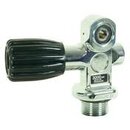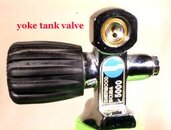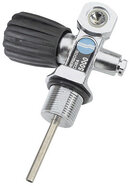- Messages
- 312
- Reaction score
- 14
- # of dives
This is a photo of the DIN VALVE with an Inlet
The inlet can be removed or placed in with an allen key. The majority of tank have this option. Where rented!

This is a photo of a YOKE VALVE
In this photo if you look close up you'll notice that there isn't an inlet. No allen key imprint!
For the recreational dive and none tec the preferred option is the Din Valve. It's simply most common.
Ask your instructor to show you materials that cover this aspect in more depth. Or do some research in google. It's interesting if your interested in the subject.
Enjoy!!!
The inlet can be removed or placed in with an allen key. The majority of tank have this option. Where rented!

This is a photo of a YOKE VALVE

In this photo if you look close up you'll notice that there isn't an inlet. No allen key imprint!
For the recreational dive and none tec the preferred option is the Din Valve. It's simply most common.
Ask your instructor to show you materials that cover this aspect in more depth. Or do some research in google. It's interesting if your interested in the subject.
Enjoy!!!





